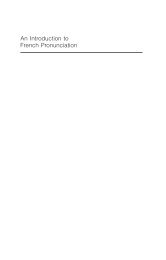English Language Teaching in its Social Context
English Language Teaching in its Social Context
English Language Teaching in its Social Context
Create successful ePaper yourself
Turn your PDF publications into a flip-book with our unique Google optimized e-Paper software.
46 ROD ELLISMy perspective is that of the outsider-<strong>in</strong>sider, for an applied l<strong>in</strong>guist is not a practitioner oflanguage pedagogy (see Corder 1973) but rather someone who looks at language pedagogyfrom the vantage po<strong>in</strong>t of knowledge gleaned from technical sources. In my case, the sourceis SLA.Technical and practical knowledgeI have suggested that two types of knowledgc can be dist<strong>in</strong>guished: technical knowledge andpractical knowledge. This dist<strong>in</strong>ction is, <strong>in</strong> fact, common <strong>in</strong> the literature on professionalknowledge (e.g. Calderhcad 1988 and Eraut 1994).Technical knowledge is explicit; that is,it exists <strong>in</strong> a declarative form that has been codified. For these reasons it can be exam<strong>in</strong>edanalytically and disputed. Technical knowledge is acquired deliberatcly either by reflect<strong>in</strong>gdeeply about the object of enquiry or by <strong>in</strong>vestigat<strong>in</strong>g it empirically.The lattcr <strong>in</strong>volves theuse of a well-def<strong>in</strong>ed set of procedures designed to ensure the validity and reliability of theknowlcdge obta<strong>in</strong>ed. Technical knowledge is generalixd; that is, it takes thc form of statementsthat can be applied to many particular cases. For this reason, it cannot easily be applied‘off the shelf’ <strong>in</strong> the k<strong>in</strong>d of rapid decision-mak<strong>in</strong>g needed to deal with problems as they occur<strong>in</strong> day-to-day liv<strong>in</strong>g.Over the years, SLA has provided a substantial body of technical knowledge about howpeople learn a second 1anguage.This is reflected <strong>in</strong> the ever-grow<strong>in</strong>g set of technical termsused to label this knowledge: overgcneralization and transfer errors, order and sequence ofacquisition, foreigner talk, <strong>in</strong>put and <strong>in</strong>take, notic<strong>in</strong>g, learn<strong>in</strong>g and communication strategies,the teachability hypothesis (see the glossary <strong>in</strong> Ellis 1994).This technical knowledgc and theterms that label it constitute the goods that are carefully guarded by practitioners of SLA.In contrast, practical knowledge is implicit and <strong>in</strong>tuitive. We are generally not aware ofwhat we practically know. For example, 1 know how to tic my shoe laces but I have littleawareness about the sequence of actions I must perform to do this and could certa<strong>in</strong>ly notdescribe them very well. In contrast to technical knowledge, practical knowledge is acquiredthrough actual experience <strong>in</strong> the context of perform<strong>in</strong>g actions by means of procedures thatare only poorly understood. Similarly, practical knowlcdge is fully expressible only <strong>in</strong>practice, although it may be possible, through reflection, to codify aspects of it. The greatadvantage of practical knowledge is that it is proceduralixd and thus can be drawn on rapidlyand efficiently to handle particular cases.Practis<strong>in</strong>g professionals (lawyers, doctors, and teachers) are primarily concerned withaction <strong>in</strong>volv<strong>in</strong>g particular case? and for this reason draw on practical rather than technicalknowledge <strong>in</strong> the pursuit of their work. Freidson (1 977, cited <strong>in</strong> Eraut 1994: 53) describeshow medical practitioners opcrate:Onc whose work requires practical application to concrete cases simply cannotma<strong>in</strong>ta<strong>in</strong> the same frame of m<strong>in</strong>d as the scholar or scientist: he cannot suspend action<strong>in</strong> the absence of <strong>in</strong>controvertible evidence or be skeptical of himself, his experience,his work and <strong>its</strong> fruit. In emergencies he cannot wait for discoveries of the future.Deal<strong>in</strong>g with <strong>in</strong>dividual cases, he cannot rely solely on probabilities or on generalconcepts or pr<strong>in</strong>ciples: hc must also rely on his own senses. By the nature of his workthe cl<strong>in</strong>ician must assume responsibility for practical action, and <strong>in</strong> so do<strong>in</strong>g he mustrely on his concrete, cl<strong>in</strong>ical cxperiencc.Teachers, faced with thc need to makc countless decisions to accomplish a lesson, must also












